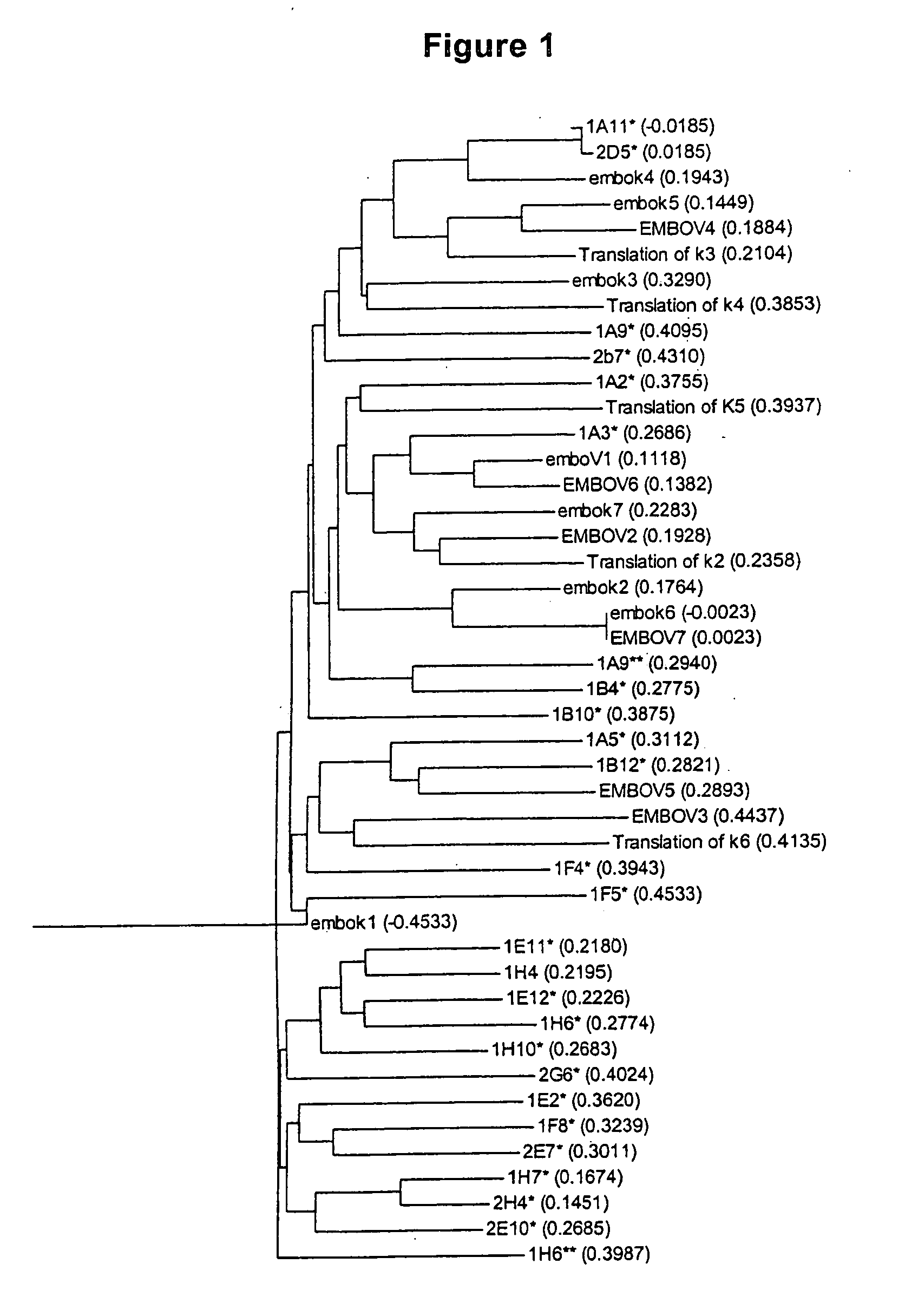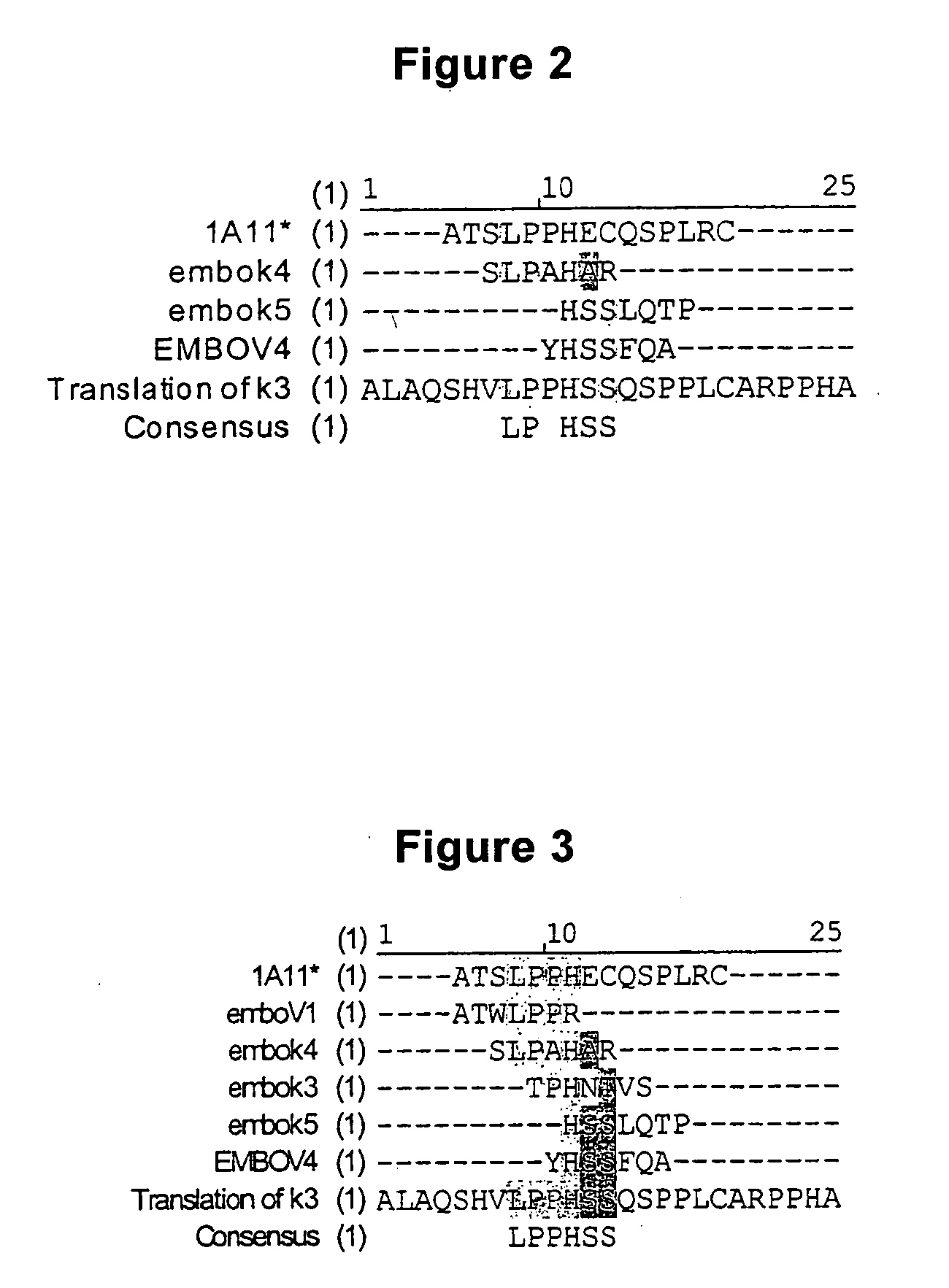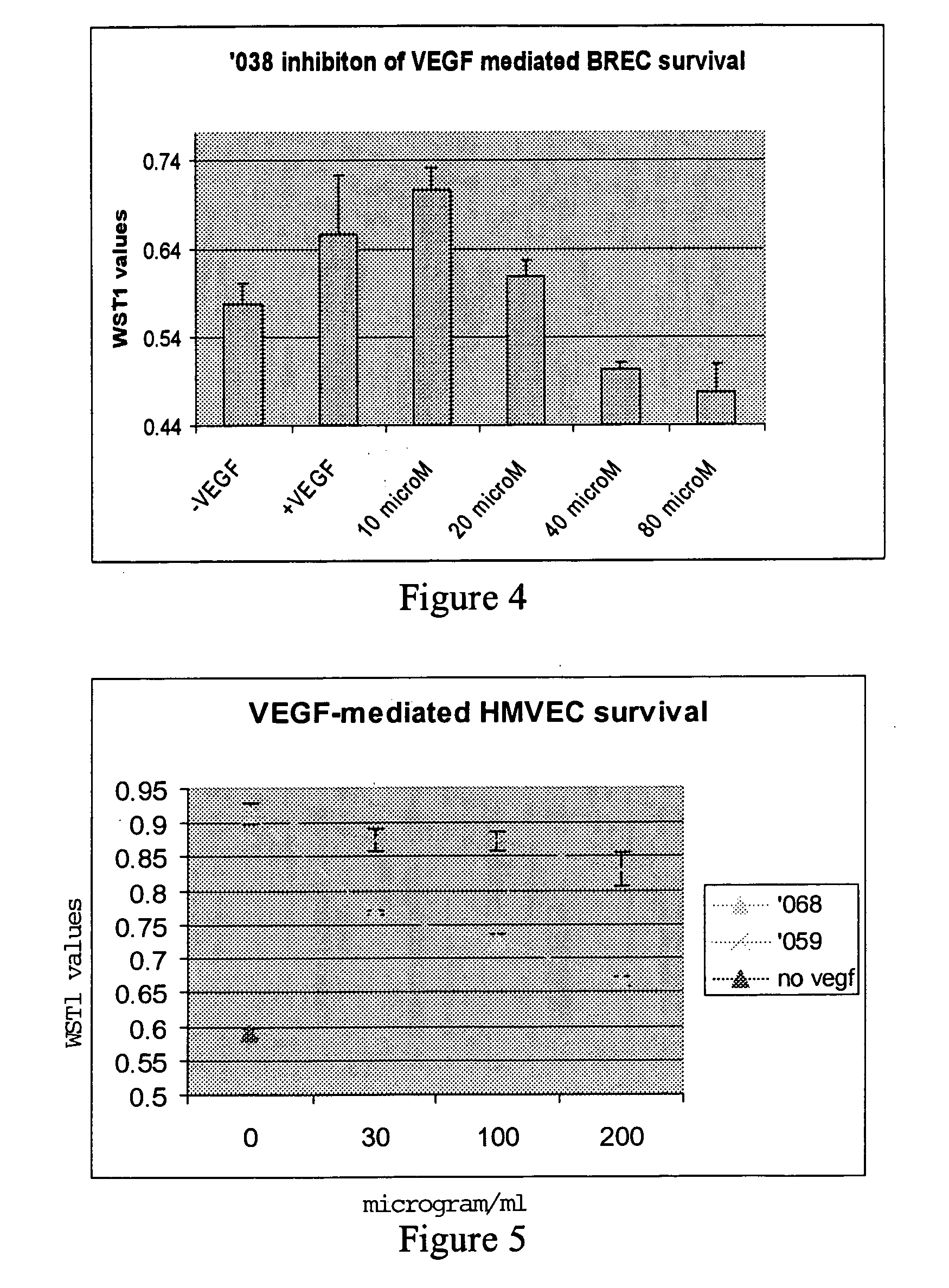Anti-angiogenic peptides and methods of use thereof
a technology of anti-angiogenic peptides and peptides, which is applied in the direction of peptide sources, anti-angiogenic medical ingredients, angiogenin, etc., can solve the problems of less effective treatment of breast cancer, and achieve the effect of less ic50 and greater affinity for heparin
- Summary
- Abstract
- Description
- Claims
- Application Information
AI Technical Summary
Benefits of technology
Problems solved by technology
Method used
Image
Examples
example 1
Identification of Novel Human VEGF Receptor KDR Binding Peptides by Minicell Panning
[0104] Methods
[0105] A minicell display library comprising random 30-mer oligonucleotides genetically fused to the gene encoding the 17K antigen of Rickettsia rickettsii in the vector pBS (Bluescript) was constructed essentially as described in U.S. patent application 20030105310,;which is herein incorporated by reference in its entirety. The library was transformed into E. coli DS410, and transformed cells were grown in a 250 mL culture overnight in rich medium (Terrific Broth). Minicells were purified by differential centrifugation at 9.3 K rpm.
[0106] An ELISA-based binding assay for minicell screening was performed as follows:
[0107] Costar high binding plate 3361 was coated with 5 μg / ml KDR receptor (R&D systems, 357-KD) diluted with 100 mM sodium bicarbonate 30 mM sodium carbonate pH 9.5 coating buffer—50 μl / well. Coating buffer was added alone to two wells as negative control wells.
[0108] P...
example 2
Generation and Studies of D-Amino Acid Derivatives in 1% or 10% Serum
[0128] L-amino acid peptides are unstable when exposed to serum due to their susceptibility to serum protease digestion. It was hypothesized that generating serum stable derivatives of L-amino acid peptides would improve their pharmaceutical attributes. For this reason D-amino acid derivatives of the original peptides were generated and tested for serum stability.
[0129] Methods
[0130] A stock solution of 1 mM peptide dissolved in water was made. The stock was then diluted to 100 μM in either OptiMem media+100 μl / ml penicillin / 100 μg / ml streptomycin sulfate+1% fetal calf serum or in OptiMem+Pen / Strep+10% serum. The diluted samples were placed in a 24 well tissue culture plate in an incubator. Aliquots of 50-100 μl were removed at 4, 6, 18, 24, 48 and 72 hrs and frozen at −70° C. until analysis.
[0131] Samples of 20 μl were separated on a C18 column (4.8×250 mm) with a gradient of acetonitrile / water 0.1% TFA and an...
example 3
Characterization of Heparin Binding Activity of Bifunctional Peptides In Vitro
[0141] Methods
[0142] The following peptides were synthesized to test for anti-angiogenic activities in vitro and in vivo:
ST100,032YDGRGDSVVYGLKKKAARGRRA(SEQ ID NO.:1)ARGRRST100,033PYAGRGDSVVYGLGGGPGAARG(SEQ ID NO.:2)RRAARGRRST100,061PYDGRGDSVVYGLRKKKAARGR(SEQ ID NO.:3)RAARGRRST100,062ATSLPPHSSQSPGGGPPAARGR(SEQ ID NO.:4)RAARGRRST100,063AARGRRAARGRRKKKAPYAGRG(SEQ ID NO.:5)DSVVYGLRST100,066ATSLPPHSSQSPKKKAARGRRA(SEQ ID NO.:8)ARGRR
[0143] In addition, the following variants of ST100,064 (SEQ ID NO.: 6) and ST100,065 (SEQ ID NO.: 7) were synthesized using D-amino acids as opposed to L-amino acids to test the effect of the modification on activity and serum stability:
ST100,064RRGRAARRGRAAKKKRLGYVVS(SEQ ID NO.:6)DGRGDYPST100,065RLGYVVSDGRGDYPKKKRRGRA(SEQ ID NO.:7)ARRGRAAST100,067PSQSSHPPLSTAKKKRRGRAAR(SEQ ID NO.:9)RGRAAST100,068RRGRAARRGRAAKKKPSQSSHP(SEQ ID NO.:10)PLSTAST100,072RRGRAAKKKRRGRAAKKKPSQS(SEQ ID ...
PUM
| Property | Measurement | Unit |
|---|---|---|
| Volume | aaaaa | aaaaa |
| Volume | aaaaa | aaaaa |
| Volume | aaaaa | aaaaa |
Abstract
Description
Claims
Application Information
 Login to View More
Login to View More - R&D
- Intellectual Property
- Life Sciences
- Materials
- Tech Scout
- Unparalleled Data Quality
- Higher Quality Content
- 60% Fewer Hallucinations
Browse by: Latest US Patents, China's latest patents, Technical Efficacy Thesaurus, Application Domain, Technology Topic, Popular Technical Reports.
© 2025 PatSnap. All rights reserved.Legal|Privacy policy|Modern Slavery Act Transparency Statement|Sitemap|About US| Contact US: help@patsnap.com



